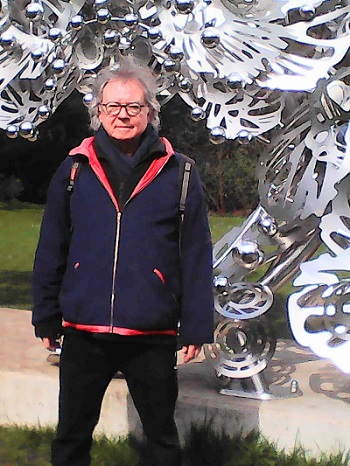 SENSE member Michael Dallas (on the left, photographed by Sheila Gogol at Beatrixpark in Amsterdam-Zuid in 2021) has been actively contributing to the Society since he joined many years ago. His numerous and informed editing and translation suggestions posted to the Forum on our website have helped many SENSE members. But his contribution goes beyond that, as he is the compiler of a supplement to the Van Dale Dutch-English dictionary, colloquially known as the ‘Van Dallas’, available in our Library. In the following interview, Michael shares with us a bit of his history and how he began compiling his extraordinary supplement.
SENSE member Michael Dallas (on the left, photographed by Sheila Gogol at Beatrixpark in Amsterdam-Zuid in 2021) has been actively contributing to the Society since he joined many years ago. His numerous and informed editing and translation suggestions posted to the Forum on our website have helped many SENSE members. But his contribution goes beyond that, as he is the compiler of a supplement to the Van Dale Dutch-English dictionary, colloquially known as the ‘Van Dallas’, available in our Library. In the following interview, Michael shares with us a bit of his history and how he began compiling his extraordinary supplement.
Can you tell us about your professional background?
I joined SENSE in 1995, shortly after I started translating and editing professionally in the social sciences and social work. I soon also developed a specialization in mental health, mainly epidemiology. All those fields had plenty of jargon that I needed to keep track of. I had previously held clerical jobs in the Universiteit van Amsterdam’s Faculty of Social Sciences, where I had gained some experience on the side working with researchers on their English publications.
I understand that you once had dual American-Dutch citizenship. What brought you to the Netherlands and what made you stay?
I decided to emigrate from the US while doing my ‘junior year abroad’ in England. I would have chosen England, Germany or Denmark as my destination, but I later made four Dutch friends in New York who persuaded me to move to Amsterdam. They met my boat at the Amsterdam Passenger Terminal and helped me learn Dutch and find housing, work and friends. From the very beginning, I planned to settle in Amsterdam for good. That was almost 50 years ago. I identify as Dutch or European, not as American. I gave up my US citizenship about ten years ago, after the Dutch banks started imposing restrictions on US citizens.
Your supplement to the Van Dale Dutch-English dictionary has more than 700 pages of original and useful Dutch terminology translated to English. Can you tell us about the genesis of this impressive list? Have you thought of publishing it?
The idea originated about 20 years ago when SENSE member Joy Burrough announced on the Forum that some of her reference books had been destroyed by a fire in her office. I pulled out my Van Dale NE (which was already falling apart) and realized how vulnerable it was. I had jotted notes down the margins of almost every page.
Although digital terminology systems already existed then, I preferred a hands-on approach. I decided to transfer all my margin notes into a Word document that could be stored externally. I had just acquired a voice recognition program, so I first dictated lists of Van Dale entries section by section, then switched to English, repeatedly said ‘move down three’, and then dictated the English translations under the Dutch words. I was surprised how smoothly that went. The original version looked much like the current one, but it had only 400 pages. I was mainly concerned with specialized jargon, but also with difficult-to-translate expressions like aansluiten op/bij.
Theoretically I could have tried to further manicure and publish the list, but that seemed like too much work and stress, so I began sharing it with colleagues. I’ve developed the habit of plucking new entries from various sources, often the SENSE Forum. Working for academics, I don’t have many rush jobs, so I have time to contemplate and note down possible translations. Many of the English terms listed are a result of ‘thinking out loud’ while translating.
You are an editor and a translator from Dutch to English who also has a Bachelor of Arts in German. Are you appreciative of multilingualism? Why?
When I obtained my BA in German in New York, I was mainly just interested in moving to Germany. In Amsterdam I earned a Bachelor's in sociology, and that was more serious. But remembering my unfulfilled ambition to live in Germany, I rented a pied-à-terre in Berlin 17 years ago, where I stay about half the time. I belong to a translators’ forum and Stammtisch. I wondered at first whether I could work in German, but in practice I’ve kept working for Dutch clients only. I no longer think I’ll ultimately settle in Berlin.
I realized the value of multilingualism when I took Latin (my first foreign language) in high school in the US. I’ve found that learning the grammar, structure and vocabulary of another language gives you tremendous insights into your native language. Since then I’ve dabbled in Spanish, French, Danish and Czech, but Dutch and German are the only foreign languages I speak fluently.
What have you found in SENSE that has made you stay a member for so long?
I’ve only held one office in SENSE, that of Membership Secretary 25 years ago, but I’ve long contributed my insights about vocabulary and rules of publication style to the Forum. In return I’ve learnt a lot from the many accomplished language professionals in SENSE, both via the Forum and at workshops and meetings. Volunteering gives me a sense of fulfilment if I believe I’m helping other people, but it also makes me more aware of what I know and do.
What do you like to do in your free time?
Nowadays I spend a good deal of my free time reading informative articles on the internet and catching up on books I’ve had on the shelves for years (e.g. I’m now reading up on Habermas). I read mostly non-fiction texts on history, society and politics. I also walk or cycle every day and travel occasionally in Europe, either alone or with friends.
|
Blog post by: Paula Arellano Geoffroy Website: paulaarellanogeoffroy.com LinkedIn: paula-arellano-geoffroy |

When I became an editor, I believed my job would mainly be spent in the study of right and wrong. Style guides and dictionaries in one hand, red pen clutched in the other, I was ready to supply grammatical and syntactical improvements. And yet, when I moved from the US to Japan and began working with Japanese companies that were writing for western audiences, I found myself spending most of my time wading through the world of subjective edits.
When editing across cultures, it becomes so much more complex than words on a page. The once-clear rules of grammar and punctuation become blurred as you switch from one version of English to another. Voice, tone, scope, and word choice are ever shifting as you consider the cultural backgrounds of both the author and the audience. How do you decide how heavy-handed to be? How do you help the author maintain the integrity of their piece while making it digestible for a foreign audience?
Unfortunately, there is no correct answer. While we can find some guidance in published literature, it is ultimately up to international editors to help the author find a successful balance for their work. For me, I’ve found that beginning with a few small things can go a long way.
1. Begin with mechanics
Does the audience use the metric system or the imperial system? American or British spelling? Adjusting the mechanics of the piece to the viewpoint of the audience can improve readability and help the author more easily connect to the intended audience.
2. Consider general knowledge
Most authors write from the standpoint of their own society’s knowledge base. The challenge is that the general knowledge of each culture is different. For example, an author may need to specify that Sir Don Bradman was an Australian cricket player when writing for American audiences or that Russell Wilson is an American football player when addressing Australian audiences. Japanese audiences will likely understand the date range of the Edo period but not that of the Irish Civil War. Helping an author bridge these knowledge gaps is essential when editing on the international level.
3. Address the goals of the author and the audience
The goals of both the author and the audience will change from piece to piece. Understanding the goals of both parties will help us successfully navigate the editing process. Is the author intending to write a text that introduces their unique cultural outlook and challenges the reader, or are they aiming to create a narrative that blends seamlessly with the audience’s worldview? Likewise, is the audience intending to learn more about a new culture or are they looking for something closer to their comfort zone?
4. Verify inclusive language
As editors, we are constantly on the lookout to avoid non-inclusive language. However, when editing internationally, we must also understand how the definition of inclusive language changes from country to country. It’s vital that we understand our audience’s inclusivity guidelines so that we can help the author avoid any unintended offenses.
As globalization continues to pull our world closer together, it becomes increasingly important for editors to be able to edit across countries and cultures. While there aren’t always clear-cut answers for this line of editing, the more we editors are able to discuss our choices, the more we can work together to ensure we are providing authors with the best edits possible.
|
Blog post by: Taylor Steed Website: taylorrsteed.contently.com LinkedIn: taylor-steed |

Those attending the SENSE 2023 Annual General Meeting this March (or reading the 2023 AGM bulletin) may have been surprised to see the announcement that the organization’s Executive Committee (EC) was being pared down to five (Chair, Treasurer, Secretary, and two Members-at-large) from eight members, with five former EC positions now designated as Team Leaders (Content Manager, Web Manager, Social Media Coordinator, SIG & Social Events Coordinator, and Continuing Professional Development Coordinator).
This change was not some draconian power grab but a move to allow the EC to focus on strategy while the Team Leaders (TLs) can focus on their respective tasks without the need to attend too many meetings, and also to better shield individual members from liability, in line with a new (well, from 2019) act called the Wet Bestuur en Toezicht Rechtspersonen (WBTR).
Compliance with the act was brought up at the 2022 AGM as well. The act applies to all associations with members (verenigingen) such as SENSE and to foundations without members (stichtingen). The WBTR’s general aim is to ensure good governance, better defined as having things run cleanly and with a minimal risk of conflict of interest and liability. The new legislation defines executive and supervisory tasks in an organization, ensures that there are provisions for dealing with EC members who can no longer serve due to illness for example, and offers a template for organizations to clarify the roles and tasks of EC members.
Under the new act, personal liability of EC members has been expanded in cases of serious maladministration, such as improper filing of accounting documents or entering into agreements that cannot be fulfilled. There is also more clarity around what constitutes individual versus group liability. In this regard, liability of SENSE has not been changed by the act, but only personal liability in case of maladministration.
What kind of liability could EC members of an organization like SENSE face? The example from last year’s meeting was a theoretical Treasurer running off with a large sum of money. Would the WBTR apply in this case? Yes, if the EC does not have clear rules and guidelines in place that would prevent the Treasurer from doing something like this, then EC members could potentially be held liable.
The WBTR also includes new rules about what to do in the event of an EC member’s absence and explicitly forbids EC members from participating in meetings or voting on issues in which they have a conflict of interest.
The EC is currently composing governance guidelines that will apply to EC members. They are also in the process of identifying the parts of the SENSE Constitution that will need to be adapted to bring them in line with the new legislation. Once complete, a draft of the updated Constitution will then be shared with SENSE members for discussion and eventually approved by the membership at a General Meeting.
------------------------------------------
Acknowledgement
Special thanks to the following contributors: Hans van Bemmelen, Sally Hill, Samuel Murray, Margreet de Roo, Curtis Barrett and Paula Arellano Geoffroy.
|
Blog post by: Anne Hodgkinson Website: rosettastonetranslations.nl Blog: bootsandbowtie.com |
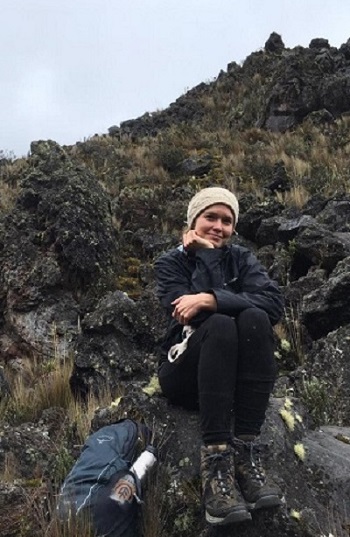 It’s always a pleasure to find people interested in writing and literature, so I reached out to fellow SENSE member Sarah Foster to invite her to share her background and interests with us and to welcome her to SENSE.
It’s always a pleasure to find people interested in writing and literature, so I reached out to fellow SENSE member Sarah Foster to invite her to share her background and interests with us and to welcome her to SENSE.
You are American, but have lived abroad for a long time. Can you tell us a bit about yourself and where you are from?
I’m originally from Virginia, but I had lived in Ecuador for most of the last ten years. I studied history and comparative literature in the US. My professional background is a mix of education, journalism, writing, and translating. I used to teach full-time. I love working with students, but I think the flexibility of freelancing is a better fit for me. I started off with a few random translating and editing jobs until I felt more confident and built up a repertoire of skills and services that I could offer. I wrote for a travel magazine, translated film scripts and subtitles, and did a few reporting projects on conservation and environmental issues in Ecuador. I recently finished a longer project developing an intercultural communication course for an NGO.
May I ask what brought you to the Netherlands and how are you getting on with Dutch?
My partner found a job here, so we decided to make the move. I was also ready for a change of pace and looking forward to more professional opportunities. I understand Dutch quite well, and I can manage most basic interactions. Watching TV shows and reading children’s books are helping me to learn more vocabulary and grammar. I hope to make some progress over the next year so that I can start to use Dutch more in professional contexts.
How did you learn about SENSE and why did you decide to join?
I have been freelancing since 2016, but I left most of my clients and professional network behind when I came to the Netherlands. I started looking for resources for Dutch freelancers. I came across SENSE and thought it would be a good way to make connections.
It must be challenging to be studying and working at the same time. How do you manage?
I’m studying in an environmental humanities graduate programme at Vrije Universiteit Amsterdam, and I also work on my freelance business. It’s been really busy, but both are important to me. Recently, I’ve done mostly fact checking, translation (Spanish-English), and editing.
I’m really enjoying my graduate school experience, and it’s helping me to specialize in environmental research. I’ve gotten to work on projects about landscapes, conservation, climate change, and environmental philosophy. If you are looking for a researcher, writer, or editor for an environment-related project, please feel free to reach out (website: sarahjanefoster.work; LinkedIn: sarah-jane-foster).
I also write poetry and nonfiction and I’d love to connect with other writers here in the Netherlands.
What do you like to do in your free time?
Well, I used to do a lot of hiking, but there aren’t many mountains around here! I’m starting to enjoy cycling, and I also like ceramics and singing.
Is there anything that you would like to share with the SENSE community?
I hope to find spaces to learn from other people’s experiences, and I’m also very happy to share my own! I’m glad to now be a part of the community.
|
Blog post by: Paula Arellano Geoffroy Website: paulaarellanogeoffroy.com LinkedIn: paula-arellano-geoffroy |
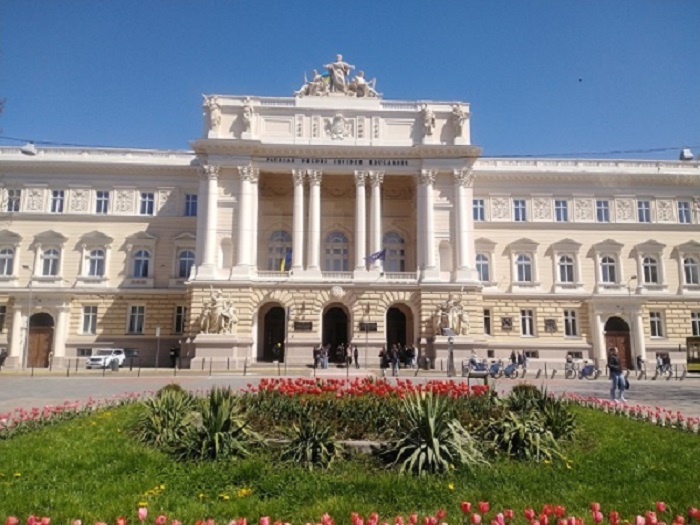
On Friday 14 April 2023, UniSIG members were joined via Zoom by Tatyana Yakhontova, professor of the Foreign Languages for Sciences department at the Ivan Franko National University of Lviv. Professor Yakhontova, who is a founder of the first Center for English Academic Writing in Ukraine and author of two textbooks on English academic writing, spoke about traditional and changing approaches to the written word in Ukraine, specifically in academia.
At the start of the meeting, the professor gave members pause for thought when she described the impact of the continuing war in Ukraine. The historic city of Lviv, though considered a relatively safe place for refugees from eastern Ukraine, is still regularly under attack. Cages erected to protect the many UNESCO sculptures in Lviv serve as a daily reminder of this context.
Professor Yakhontova spoke on the strong ‘culture of the word’ in Ukraine, and the value placed on grammatically and stylistically correct texts. Traditionally, writing was seen as a natural talent, not a skill that could be developed, and instruction was implicit. In Soviet times, copy-editing was used as a controlling, prescribing and censoring activity. Professor Yakhontova shared a personal anecdote wherein the copy editor of her first journal article drastically changed the text, and the changes made were not up for discussion. So it was in Soviet times.
After Ukraine’s declaration of independence in 1991, the world of academic writing and copy-editing began to change. There was broad support across society for a new ‘enlightening mission’ of copy editors, and the focus was placed squarely on the quality of the finished text. Notably, the original author of the text was now in a position to reject proposed changes! In the discussion that followed the talk, it was remarked how much copy-editing as a profession was valued in comparison to some other countries. Currently in Ukraine, both the copy-editing and the revision of all texts to be published are held in high regard, and almost all copy-editors are employed by publishers. This is in contrast to the freelance markets elsewhere, for example in the Netherlands and in the UK.
The reasons for these changes can be located in Ukraine’s striving for integration in Europe, the increased collaboration with US and European colleagues, and the development of applied linguistics, particularly in discourse and genre studies. In turn, these developments yield practical implications that can be used in teaching writing, and academic writing in particular.
Academic copy-editing in the English language in Ukraine is only sporadically sought out by people who work in the university system, who must publish in English ‘or perish’. However, these scholars often possess an insufficient level of English. If students are expected to write in English, for example in the case of English literature students, it is simply expected that they will know how to do so. This is also the case for many researchers, who seek writing assistance only informally. At the same time, there is increased instruction in academic writing, for example, through short training courses and writing courses aimed at doctoral students.
Concerning academic writing in the Ukrainian language, even less copy-editing support is available, which may reflect the traditional view of writing as a natural talent. At the same time, copy-editing of texts written in Ukrainian continues to be seen as a socially important activity that helps to celebrate and preserve the national language. This reflects a feeling of pride in the written word that is even more evident since the 2022 invasion.
People who attended the meeting, among whom were guests joining from outside the Netherlands, offered perspectives on English language proficiency, copy-editing and writing instruction (or lack of) in the UK, the Netherlands, Finland, South Africa, Switzerland and Kazakhstan.
|
Blog post by: Tomas Brogan LinkedIn: tomasbrogan |
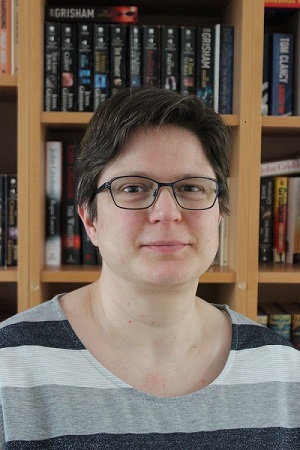 On Saturday 20 May 2023, Margreet de Roo will give a workshop for SENSE about working with MS Word. In the following interview, I ask Margreet about her workshop, what the public can expect and why it might be interesting to attend.
On Saturday 20 May 2023, Margreet de Roo will give a workshop for SENSE about working with MS Word. In the following interview, I ask Margreet about her workshop, what the public can expect and why it might be interesting to attend.
Could you tell us a little bit about your background and how you came to give training sessions on MS Word?
I have spent the last ten years working as a freelance editor and translator and I gained a lot of experience with MS Word during this time. I was curious about what else the program had to offer, so I set out to learn more. I started reading books and taking courses, applying this knowledge in my own work. I gradually expanded my experience and in 2017 I started to give workshops about MS Word myself.
Is this workshop aimed at beginners or advanced users of MS Word?
This workshop is aimed at both beginners and advanced users. Anyone who uses MS Word on a regular basis will be able to get something out of this training. Participants of my past workshops have often said they learnt so many new things, despite having worked with MS Word for years. Language professionals often don’t know all the different functions and possibilities the program provides. However, you can work so much faster and more efficiently if you know how to personalize MS Word and make use of all its options.
What will participants learn during the workshop?
We’ll focus on different topics such as how to use macros, create shortcut keys, and personalize the ribbon and the quick access toolbar (QAT). You’ll also get an introduction into the use of the proofreading software PerfectIt. The aim is to make sure you’re able to work faster and more efficiently by identifying the functions that are useful to your work and personalizing MS Word to suit your needs. On top of that, I would like to make working with MS Word more fun, and challenge you to learn more about it, and everything it has to offer, on your own. Another important thing to mention is that attendees can always contact me, even months after the workshop, if they have any questions about the things they learnt during the workshop. I will help people along if they forgot something or can’t remember how to apply some of the techniques.
Aside from improving your knowledge of MS Word and thereby improving your productivity and effectiveness as a language professional, this workshop will also be a great way to get to know colleagues and make new contacts during lunch and the different coffee breaks. There are plenty of reasons to sign up, I’d say! If you’d like to attend the workshop, please register on the SENSE website. I hope to see you at Park Plaza in Utrecht on 20 May.
|
Blog post by: Maaike Meijer LinkedIn: maaike-meijer |

When I was studying for my degree in translation, several teachers pointed out the benefits of joining a professional organization, and SENSE was one of the organizations whose name came up. I was eager to discover more about SENSE, so I registered to join the 2020 Jubilee Conference as a guest. Because of the pandemic, this event was moved online. I enjoyed everything that was on offer during the conference and I learnt a lot, so I decided to go ahead and become a member.
In the following years I attended many more online SENSE events, including the Annual General Meeting (AGM) in 2021 and 2022. The AGM of 25 March 2023 was the first in-person AGM in quite some time and it was also the first large in-person event for me. I had previously spoken to some SENSE members during various Zoom meetings and workshops, so I was excited to meet everyone face to face.
The ‘meet’ of the matter
Luckily, I had been to the meeting venue at Park Plaza before, so I did not have any trouble finding the place. The doors opened at 12:00, which gave members the opportunity to meet, catch up, and discover new books in a mini book-swap before the meeting started at 13:00 sharp.
During the meeting, we discussed the minutes of the previous AGM and the reports from the Executive Committee (EC) and Team Leaders. We also looked at SENSE’s new organizational structure and voted for the election and re-election of several members. After discussing the points that came up during the ‘Any Other Business’ portion of the meeting, we took some time to thank the retiring EC members and all other volunteers for their valuable contributions.
Despite the full agenda, we managed to end the meeting right on time. The minutes of the meeting will be shared with SENSE members at a later stage.
Wrapping up the day
After the meeting concluded, many of us stayed and joined a singing workshop. There was singing (now, I don’t think the teacher was extremely impressed with the vocal prowess of most of us, but I thought we sounded pretty good!) and there was even some dancing. I think we all enjoyed being able to move around a bit after having sat down all afternoon.
Some of us then went on to have some drinks at the hotel bar and a very nice meal at an Indian restaurant. All in all, I felt it was a productive and fun day.
|
Blog post by: Naomi Gilchrist LinkedIn: naomi-gilchrist-translator |

On Friday, 10 February 2023, Kenneth Quek, a Chinese Singaporean who lives and works in Helsinki as a freelance editor, spoke online to 18 UniSIG members. Coming from Singapore, a country with the third highest population density in the world, a multicultural society and a postcolonial past, he is familiar with the need to respect cultural identities.
During his talk, he first explained how important it is for the Chinese and Southeast Asians to establish a context. Perhaps you may have heard how when Chinese students are shown a photograph of a tiger in a forest, they focus on the context, the forest behind the tiger, whereas American students focus on the tiger itself. Kenneth told us that although those coming from different cultures might be acting in good faith, these differences in perception can cause misunderstandings to occur.
Cultural attitudes have implications when conducting business, and this can be traced back to Asia’s hierarchical culture. Age-related factors such as having seniority within a company or simply sporting a white beard inherently command respect. Needs and desires are culture-bound and Kenneth recommended that you first need to convince the Chinese and Southeast Asians to allow you to help them. In line with their cultural expectations he said, ‘you do a favour to get a favour’. He mentioned that ‘there’s an assumption that we’re going to run into this person again’ so we need to establish a rapport from the very start. He added, ‘It’s important to build trust in your relationships’.
Kenneth also referred to how the postcolonial historical context has coloured Asian people’s feelings in their relationships with Westerners. He remarked that ‘there’s a lurking sense that the West doesn’t have Asia’s interests at heart’. In his own country of Singapore, the British colonizers brought in Chinese labourers in order to maintain their power, fully aware that these indentured workers could easily be controlled through their high debt. It was not until 1963 that British rule on the island ended.
Unfortunately, there was little time left to exchange each other’s experiences in editing or teaching Asian students or to discuss our own encounters with Chinese and Southeast Asian clients. One SENSE member, who teaches in Switzerland, wrote in the Zoom Chat that she knows that her Chinese PhD students would never dare to disagree with her because of her age and position. Kenneth had exclaimed earlier that ‘you’re making it harder for them by asking them what they think’. Apparently, it is wise to come up with strategies you can employ in specific educational settings as otherwise you might make Asian students, or even clients, feel uncomfortable.
We were all surprised when, at the end of his talk, he remarked that if we were to remember one take-away, it would be that food is the best way to connect with Asian people. It seems that they take great pride in their regional cuisine. Moreover, Kenneth emphasized how necessary it is to find a common ground, and by sharing and talking about food we can achieve this goal. Apparently, in today’s rapidly changing globalized world, strategies are not only needed in the classroom, but in all cultural exchanges, with the hope that misunderstandings can be avoided and that cultural boundaries can be transcended.
|
Blog post by: Michelle Mellion Website: www.totheletter.nl LinkedIn: michelle-mellion-doorewaard |
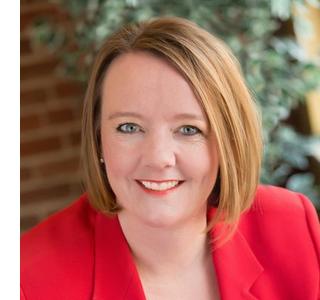
Karen McMillan Tkaczyk (mcmillantranslation.com) is a Scottish chemist-turned-linguist with a Polish surname living in Colorado. Ever since meeting Karen at a UK translation conference back in 2011, I have found this a fascinating combination. And given her extensive experience as a French-English translator and trainer, I was pleased to hear she’d agreed to give an online workshop for SENSE. This was held on 15 November 2022 for a group of more than 25 SENSE members.
Spot the deliberate mistake
During the 2-hour session, Karen shared her principles for proofreading and editing (our own work and that of others) but she also dealt with pricing, and dealing with emergencies and tight deadlines. Karen kept us on our toes with ‘spot the deliberate mistake’ quizzes in between her other slides and used the chat to ask for our input, which kept things nicely interactive. A topic such as proofreading and editing naturally requires definitions, and Karen clarified from the start that she sees editing basically the same as revision (making changes to a text), and proofreading the same as copy editing (correcting obvious mistakes or style guide discrepancies).
If in doubt, don’t!
She also touched on client communication – that we should make sure to tell the client beforehand what we’re going to do, to avoid surprises. And she encouraged us to be aware of the difference between an improvement and a personal preference, and between a correction and a suggestion; the take-home message being ‘if in doubt, don’t!’ When correcting the work of others, during quality control or translation revision, Karen emphasized the importance of critiquing the process rather than the person.
Dragon breath
We also discussed software and other tools of the trade to help us spot mistakes and inconsistencies, and several participants indicated that they would be trying out some of Karen’s suggestions, including Xbench (quality assurance software for translators) and PerfectIt (consistency checker in Word). One term that I’d not heard of before was ‘dragon breath’, which she used to refer to mistakes arising in a text due to speech recognition software such as Dragon NaturallySpeaking. Conversely, text-to-speech software can be useful for discovering mistakes in your text by when you listen rather than read.
Per word, per hour or per project?
In terms of pricing, Karen discussed the pros and cons of charging a word rate, hourly rate or project rate – she has found that many of her clients accept a flat fee per project. Such a strategy has the advantage of fast work benefiting the word-worker rather than the client, but this may involve some negotiation.
Resources
After the workshop, in addition to sharing her slides, Karen sent us some extra resources: a document explaining her quality assurance procedure for translation, her checklist for editing a manuscript for a journal, and a document listing the resources she had mentioned during the session plus many more – these included lists of software, style guides, websites and training courses.
Given the limited time, I felt that Karen covered a lot of material that was useful both to translators and editors, with many of her tips also applying to copywriters. I hope that next time she is in Europe she will be able to give an in-person workshop for SENSE.
|
Blog post by: Sally Hill LinkedIn: sally-hill-nl Twitter: SciTexts |

John Lennon allegedly once said that life is what happens while you are busy making other plans. I suppose Mr Lennon was not thinking about lunch in particular, but it nevertheless seemed to apply to the Southern SIG lunch on 8 September 2022.
The conveners had originally planned to have two lunch events. Unfortunately, the first one had to be cancelled and the second one had to be unexpectedly relocated at fairly short notice. In the end, Southern SIG welcomed a grand total of four attendees to Maastricht.
Although it would have been nice to see more people, we had a wonderful time catching up and greatly appreciated the complimentary lunch, with a special mention to the carrot cake. Moreover, the upside of a modest gathering is that you can have a proper conversation with everyone present.
Before diving into the meeting’s topic of networking, we had a lovely chat about a vast array of subjects. Did you know, for instance, that one does not become a volunteer tour guide at the Victoria & Albert Museum overnight? In fact, new recruits have to start in the cloakroom and then work their way up the ranks before they are entrusted with the great responsibility of taking tourists around the museum!
We then discussed the importance of small talk. We shared a real-life example of a co-worker who never uttered a word, save for ‘good morning’ and ‘goodbye.’ It turned out the gentleman in question was not unwilling to strike up a conversation but did not know what to talk about. It would seem this is an ailment mostly suffered by men, although the cure is surprisingly simple – just try asking someone a question. If you are the silent type, you could ask them how their journey to work was or if they have any plans for the weekend. Before you know it, you will be engaging in small talk.
We also discussed networking and how conferences can be beneficial for your freelance business. As a language professional, you have plenty of annual conferences to choose from, but you should keep in mind that attending one can be a significant expense. Travelling to the venue, booking a hotel, the conference ticket itself, fringe events, meals and entertainment can cost up to a thousand euros. That said, it is a great way to meet like-minded language professionals and conference-goers are usually the friendly, outgoing type. However, you will not typically meet your next big client at a translators’ or editors’ conference. If you want to meet clients, you should consider attending their industry conferences, not yours.
If you are knowledgeable about a particular subject, it could also be interesting to give a lecture or workshop about it. This way you can showcase your knowledge to peers and you will meet colleagues with similar interests or skills, which may be interesting for future collaborations.
In summary, it was a productive and pleasant lunch and Southern SIG hopes to host more in-person events in the future.
|
Blog post by: Jasper Pauwels LinkedIn: jasperpauwels |









